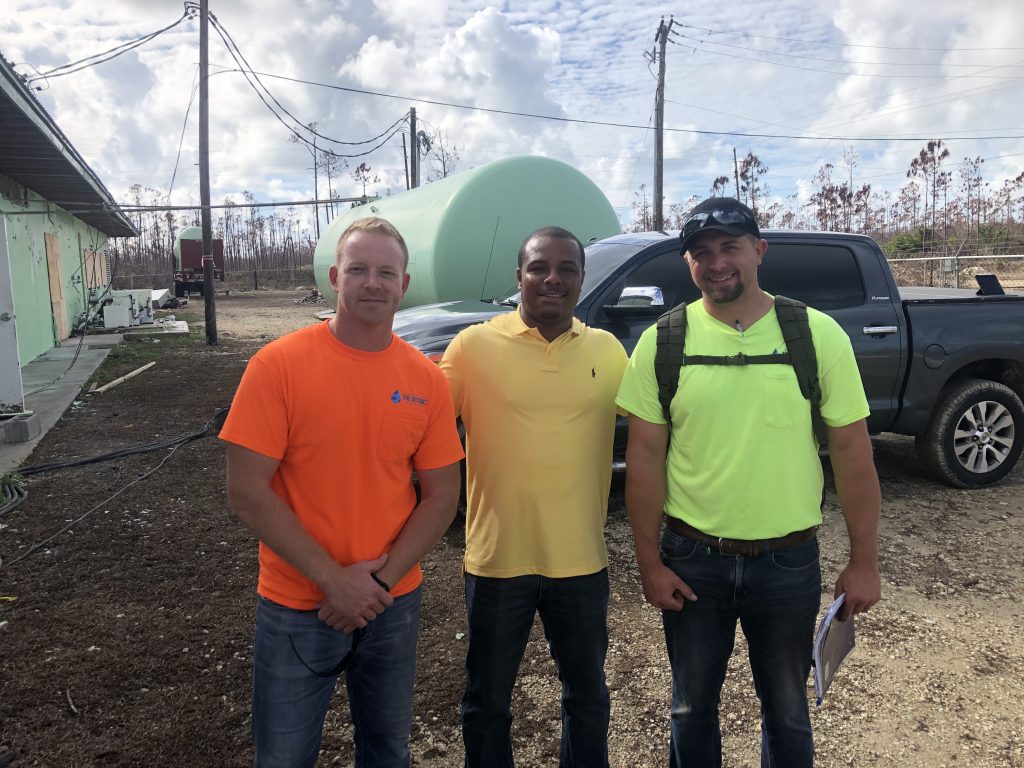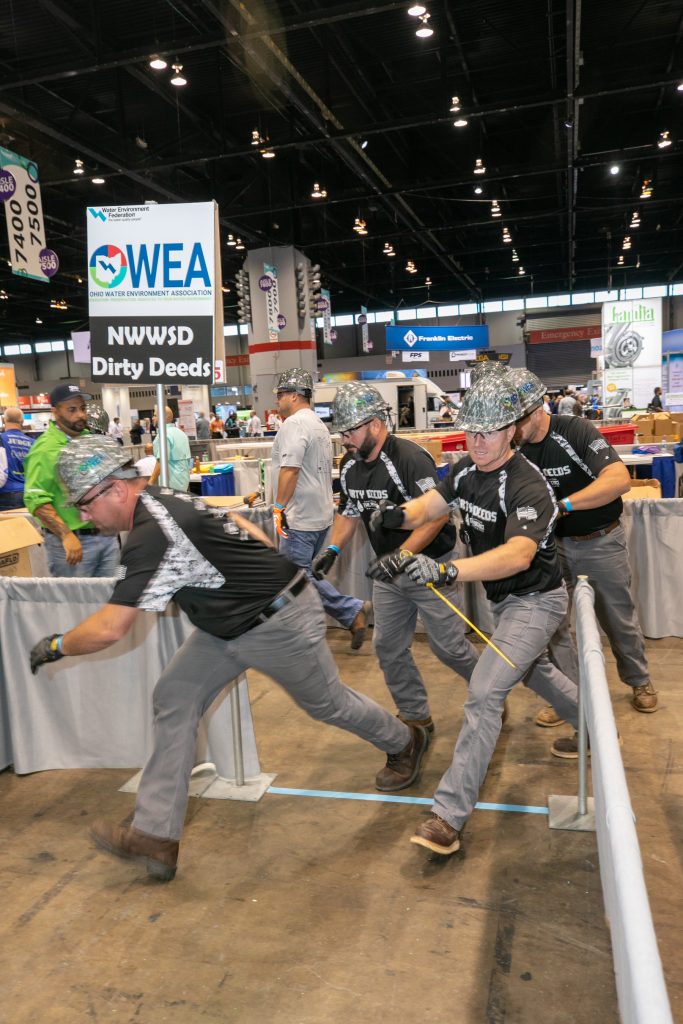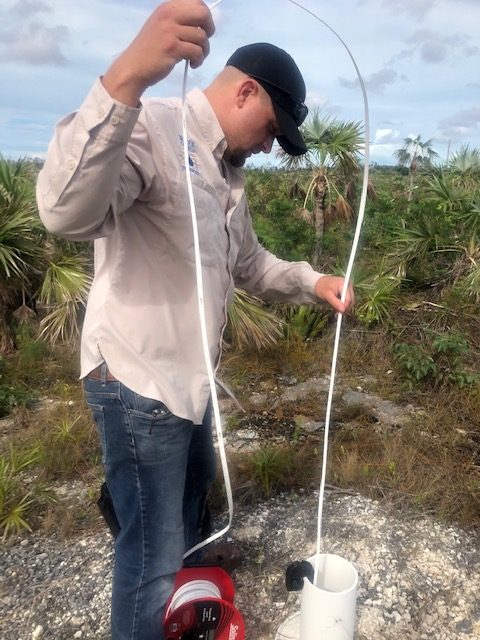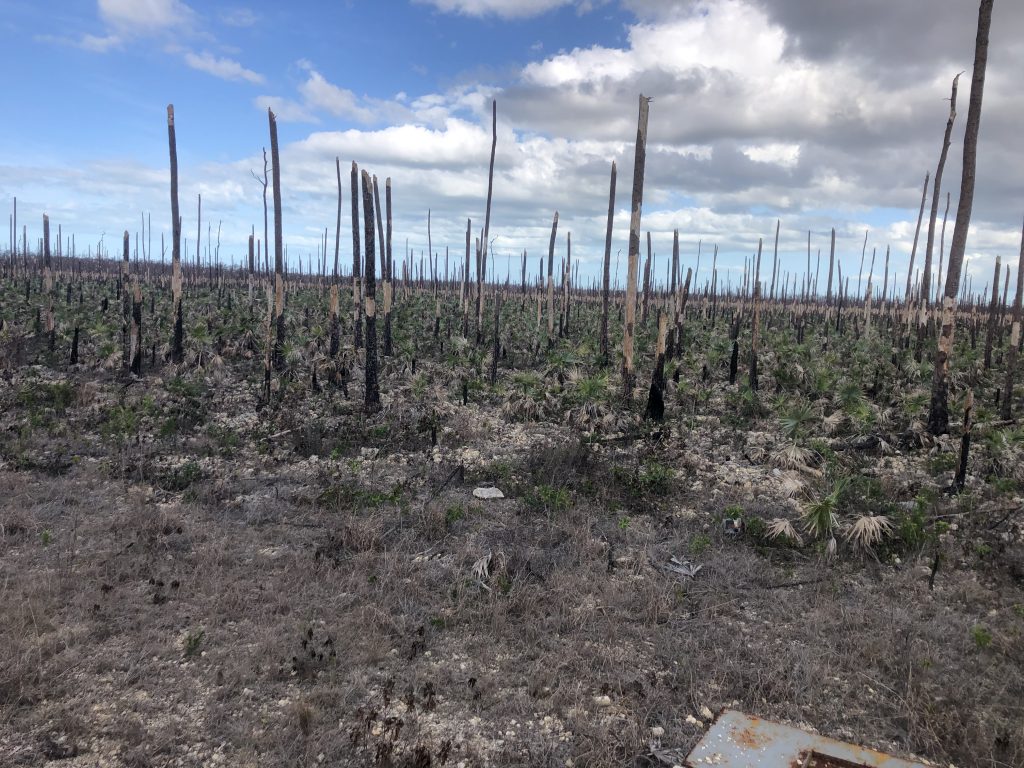WEF Members Todd Saums and Tom McGrain Aid Bahamas Relief Efforts
Todd Saums and Tom McGrain, who operate and manage water resource recovery facilities for the Northwestern Water and Sewer District (Bowling Green, Ohio) have had a busy year.

Saums and McGrain, members of the Ohio Water Environment Association (OWEA) and the Water Environment Federation (WEF; Alexandria, Va.), spent the first several months of 2019 practicing for this year’s Operations Challenge competition. Along with teammates Bryan Martikan, Jared Myers, and coach Claud Barringer, the OWEA Dirty Deeds team battled their way through state-level competitors to earn an invitation to the national-level competition at WEFTEC 2019.
But after the dust settled on Operations Challenge, Saums and McGrain were not content to let the rest of the year pass quietly by. In November, the pair spent 8 days in the Bahamas assisting with recovery efforts that are still underway after Hurricane Dorian devastated the island chain in early September.
The Search for Clean Water
Hurricane Dorian drifted slowly east toward the Bahamas, making landfall as a Category 5 storm on Sept. 1. The U.S. National Hurricane Center reports that the storm, which stalled over Grand Bahama Island for nearly two full days before returning to the Atlantic Ocean, brought maximum sustained winds of up to 280 km/h (185 mph) – making it the strongest hurricane to affect the Bahamas on record.

The destruction in Dorian’s wake remains extensive. According to a report issued in mid-November by the Inter-American Development Bank, the storm caused approximately $3.4 billion in damages in terms of impaired infrastructure, lost wages from the area’s decimated tourism and fishing industries, and debris removal costs. Not until early December, a full three months after Dorian, had Bahamian residents begun to return to their homes, reported the International Federation of Red Cross and Red Crescent Societies.
The U.S. National Aeronautics and Space Administration (NASA) estimates that Dorian dropped 0.9 m (3 ft) of rain over the Bahamas. Combined with storm surge, the sudden influx of water incapacitated wells and other groundwater-focused infrastructure, knocking out the Bahamas’ primary source of drinking water.
Saums and McGrain arrived on Grand Bahama Island on November 10 alongside a cohort of water professionals from Canada. Coordinated by Operators Without Borders, a nonprofit group of water and wastewater experts that work to restore water and sanitation infrastructure following natural disasters, the team was tasked with securing new sources of potable water. The pair worked with a group of hydrogeologists from Operators Without Borders and other aid groups, scanning the islands for electromagnetic conductivity to locate potable water.

“Tom and I performed well sampling and monitoring. We were testing a well field for conductivity, TDS, and salinity levels. That specific well field had become saturated with saltwater from Hurricane Dorian,” recalled Saums.
After several days of hard work, the Operators Without Borders team had helped move the needle on water quality in the Bahamas. However, aid workers expect the path to full recovery from Dorian to take years.
“Getting potable water is a huge task and lots of work still needs to be completed to get to that point,” Saums said after returning home to Bowling Green, Ohio. “Fresh water is the primary concern and that search is still underway.”
Water Professionals Make a Difference
Saums said he first learned about Operators Without Borders, founded in 2017, from reading the WEF Highlights article, “Operators Without Borders Makes a Lasting Difference in the Caribbean”. The first team of Operators Without Borders volunteers, which included WEF members Marcel Misuraca and Jason Mank from Ontario, Canada, spent two weeks repairing water and wastewater infrastructure on the Caribbean island of Dominica following Hurricane Maria. Reading about Misuraca and Mank – who have also participated in several Operations Challenge competitions with the Water Environment Association of Ontario OCWA Jets – inspired Saums to follow their lead.
“I found [their work] very interesting and it was something I wanted to get involved with,” Saums said. He asked his Dirty Deeds teammates if they would be interested in joining Operators Without Borders after Hurricane Dorian, and McGrain was eager to volunteer.

OWEA was equally eager to offer support to its members. Fellow Ohio water professionals helped fund Saums and McGrain’s trip along with sponsorship from Cleveland-based wastewater equipment supplier Baker and Associates.
“The members of the Ohio Water Environment Federation are proud of Todd and Tom and their commitment to travel to the Bahamas to assist with the water and wastewater infrastructure recovery efforts that are ongoing in the wake of Hurricane Dorian,” said Kim Riddell-Furry, OWEA President. “What could be better or more meaningful than water professionals assisting other water professionals in need?”
Saums agrees that water professionals are in a unique position to aid recovery efforts following such natural disasters as Hurricane Dorian.
“It is important for water professionals to get involved and share their knowledge, skills, and training. Water and wastewater services are vital to human life and basic needs. Trained professionals are a necessity in this field of work.”
Water professionals interested in lending their skills to future disaster relief efforts can apply to become an Operations Without Borders volunteer online.
─ Justin Jacques, WEF Highlights
